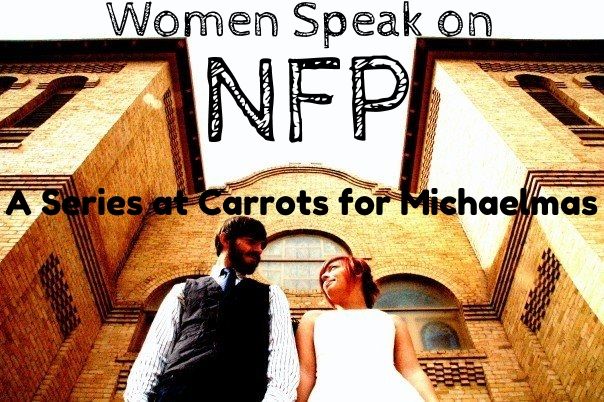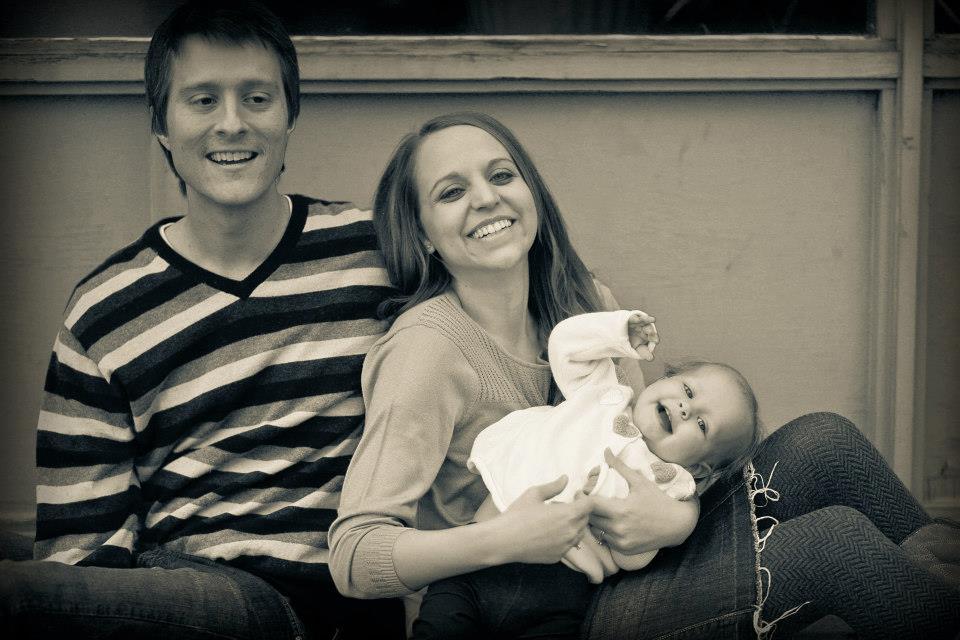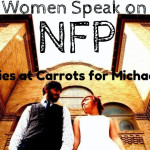Welcome to Carrots! I'm so glad you're here. This is where I share thoughts on liturgical living, faith, parenting, culture, and an extra dose of Jane Austen. You can sign up for my email newsletter here to stay in touch, or look me up on Instagram!

This is a guest post by Mandi Richards in the Women Speak on NFP series. In this series you will hear from women using various methods of NFP, some to avoid pregnancy, some trying to conceive, and their experiences.
Disclaimer: This series is not meant to be a substitute for any method of training in NFP! If you are interested in one of the methods introduced in this series, please contact a certified instructor for information about training in that method of NFP.
After I volunteered to write this post, it occurred to me that I’m probably the last person who should write about postpartum Natural Family Planning. For the majority of my postpartum period, my husband and I didn’t use NFP. We used abstinence. Complete abstinence for seven months. Yes, it was as hard as it sounds. And no, I wouldn’t recommend it to anyone.
Then I realized that I actually have quite a bit to say about postpartum NFP. I can’t say, “I used X method of NFP during the postpartum period and it was super easy.” But then, I doubt many women can say that. What I can tell you how I’ll approach postpartum NFP differently the next time around .
I learned a sympto-thermal method of NFP about six months before our wedding. I wish I could say that I carefully researched NFP methods and chose one that would work well with my lifestyle and needs. Instead, I chose the method based on which classes would fit my schedule, were the cheapest, and qualified for my archdiocese’s NFP requirement. Thinking back, I don’t think I was even aware that there were different methods of NFP at the time. Anyway, that was mistake #1.
I successfully charted my cycles until our wedding. We went into our marriage assuming that we would wait to get pregnant until my husband graduated with his PhD and got a good job. It turns out that had we waited, we would just now be trying to get pregnant because, while my husband graduated with his PhD last May, it took him over a year to find his first “real” job which he’ll be starting this fall. But God intervened and put it on our heart to start seeking pregnancy about five months after we married and we found ourselves pregnant with our first child four months after that (we used NFP to conceive).
We had hoped that after our daughter, Lucia, was born in December 2011 we wouldn’t have serious reasons to avoid pregnancy but that was not to be. While we are so grateful that we didn’t wait to start our family, when David graduated last May and found himself unemployed, we realized that it was not the time to further expand it. And it was at this point that the fear set in. I had been fairly confident using NFP before getting pregnant, but breastfeeding and postpartum hormones were game changers.
Exclusively breastfeeding, I was sure that I my cycle would not return during the first few postpartum months. That is, until my midwife informed me that I couldn’t trust breastfeeding to delay ovulation if my daughter was sleeping more than 4 or 5 hours straight at night; Lucia started sleeping 10 hours through the night at six weeks old. I know I was lucky to get a full night’s sleep with a six-week-old, but at the time I felt like I had gained sleep at the expense of intimacy with my husband.
I remembered hearing about a specific postpartum NFP class during my initial NFP classes, but there weren’t any offered in my area. So I essentially gave up and decided that we were doomed to abstinence until my first postpartum menses arrived. I was so afraid that I would miss the signs of that first ovulation and I’d wind up pregnant before my first menses and before we were financially or emotionally prepared for another child. However, when that first cycle did arrive, I realized that I had been having clear signs that ovulation would occur soon and I knew that the next time around, I would be able to trust NFP through the turbulent postpartum period.
So that you don’t have to learn to trust NFP the hard way, here are my tips for successfully using it to postpone pregnancy postpartum:
Don’t wait to learn NFP. I’ve encountered many engaged and newlywed women who have told me that they didn’t bother learning NFP because they didn’t currently have a reason to postpone pregnancy and that they would learn it later on if they needed it. While I totally agree with not using NFP to postpone pregnancy if you can welcome children into the world, waiting to learn NFP when you need it means that you will be most likely learning it during the difficult postpartum period and during a time when it is most critical that you don’t make a mistake (perhaps even for very serious medical reasons). Adding stress to the learning process is definitely not a plus.
If you have the opportunity to learn NFP and practice charting your cycles before you need it (especially during engagement), I strongly suggest you do. That doesn’t mean you have to use it to postpone pregnancy, but you should learn the basics of charting and your specific cycle. Not only is this useful in case you need to postpone pregnancy in the future, it may also help you diagnose medical issues, or help you get pregnant if you need it. While it can be used for family planning, NFP is simply knowledge about your body’s reproductive system and knowledge is always a good thing.
Consult an instructor. Since postpartum NFP is trickier, it’s that much more important that you have a relationship with an instructor who can help you as questions arise. I never spoke to my instructors after the initial classes because my cycles were textbook and I didn’t have any questions. But postpartum, oh how I wished I still had their contact information! If you no longer are in contact with your instructor or never had one to begin with, I’d suggest finding one during pregnancy or shortly after birth so you’ll have the support you need. Attend a class/schedule a session to go over specific postpartum rules and learn about some of the common difficulties experienced during that time.
Switch methods if necessary. Some methods can be easier to use during the postpartum period. Even if a method worked great for you pre-pregnancy, you may find yourself dissatisfied with it postpartum. Unless you have a baby that sleeps through the night early on, the sympto-thermal method might not be for you. Instead you may want to try mucus only methods such as Billings or Creighton. I’ve also heard of many women having success (and confidence) with the Marquette or Boston Cross Check methods because they use a Clear Blue Easy fertility monitor, so the guesswork of “What kind of mucus is this?” is taken out of the equation. Bottom line, there isn’t necessarily a “best” method for the postpartum period, but there may be a better method for YOU during the postpartum period; if one is to confusing/doesn’t seem to be working with your body, switch to another one that is more aligned with your unique needs.
Don’t resort to complete abstinence (unless absolutely necessary). All methods of NFP have rules to accommodate the special postpartum period so take advantage of them! You may have longer periods of abstinence as you follow the more strict postpartum rules, but you should be able to find at least a few days in there that are clearly infertile. You do not need to wait until menses returns to resume a physical relationship with your husband!
Be cautious, but have faith. Make sure you are well-versed on postpartum NFP and the additional rules that may apply at this time. If you are unsure of a certain rule or are having symptoms you don’t know how to interpret, it’s best to assume fertility until you can discuss it with an instructor. That said, if you are following the rules and your symptoms are clearly pointing to infertility, you should trust NFP. NFP is scientifically proven to be very effective in preventing pregnancy. The effectiveness rates of NFP methods are as high as 99% and that includes women using it postpartum.
Mandi is a 20-something wife and mother who takes her Catholic faith and reproductive system seriously. When she’s not blogging, she’s probably sleeping, wrangling a toddler, playing word games, or moving cross country.



This is great! Postpartum seems to be the hardest time for everyone, so I’m sure a lot of people will relate to this. And this is the first mention I’ve seen of the Boston Cross Check method – that’s what I use, it’s awesome! And what a cute baby.
Lindsay, I belong to a few NFP groups on Facebook and I hear about the Boston Cross Check method quite a bit! I couldn’t leave it out! And thank you for the sweet compliments.
Excellent article, Mandi! Thanks for tackling a tough and sensitive subject!
Great post! Post-partum can be so hard…especially when you’re still young (at least that’s my experience). As I’ve gotten older, maybe it’s the experience or maybe it’s the mellowing that can come with age, but the post-partum times have been easier. Thanks for writing and sharing!
Thanks for sharing, Mandi! I started learning more about NFP and reading all my symptoms after my 2nd child was born, and I completely agree with your statement about not waiting to learn. It has been a frustrating and confusing mess trying to learn anything while breastfeeding and having constant hormonal influx. I’ve been hearing more about Marquette and other similar systems through this series and other research, and I think that might work better for me.
Thank you again (and Haley for having you!) for sharing on this important stage in any mom of multiple’s NFP practicing. =)
We also abstained for 6 months after our first baby, for the same reasons! Blech! I think what’s most tragic is that it comes from a place of fear, and our fertility should be something that brings us joy! While I’m not “glad” that the same thing happened to you, it’s nice to know that my experience wasn’t singular. And proves this series is all the more important! For the sake of our marriages (and let’s be honest here, our husbands!) we’ve got to educate ourselves! Thanks for being brave enough to share.
Caitlin, I have found that there are quite a few women that have been in our shoes (oh, and their husbands too!) You are so right about fear overshadowing our fertility! I will never let that happen to me again! (Or at least that’s the plan.)
This was great! We had a similar situation after baby #1, then learned Creighton with baby #2. Postpartum cycles are still a pain to figure out, but I’m a bit more confident this time around.
What a great article! This has great advice, and I especially agree about consulting with your instructor. You need to advocate for yourself, and the postpartum time is one of the most challenging times to use NFP. I did want to bring up that sympto-thermal methods ARE equipped to handle the postpartum time. Particularly, SymptoPro teaches very specific guidelines on the postpartum time that are similar to what the mucus-only methods teach. Instructors are equipped to handle any special circumstance, even constant mucus. You can learn more about them at http://www.symptopro.org.
Lauren, I didn’t mean to insinuate that STM wasn’t equipped for the postpartum period, I meant to be more focused on the idea that some women definitely have certain methods that work best for their bodies and they they shouldn’t be afraid to chance, if necessary. We’ve only ever used STM and it’s worked for us, so I certainly don’t mean to put it down.
Yes, yes yes!!!!!! To all your tips, as a STM teacher and a fellow my-postpartums-are-crazy wife/mom, I can’t agree enough with your advice. When we do marriage prep, we stress your first tip. As teachers, we stress the rest. We’ve been there and we know how tough it is, we want all our couples to be as prepared as possible. Nothing makes me happier as a teacher than being able to help women be confident in interpreting their signs.
Yes, the first tip is important. K plans on teaching our daughters the basics when they are teenagers. I’m tired of this “you should wait until you absolutely need it” attitude some people have.
I know Marquette has an online guide for post-partum (nfp.marquette.edu). From the manual, it seems to have the least abstinence because the monitor can sort out false positives without the 3 day count.
I’ve heard good things about Boston cross-check and Symptopro, but can’t find much info about the methods themselves. Billings is fantastic, but it’s very much a put-all-your-eggs-in-one-basket-and-watch-that-basket method.
Years ago we got through post-partum with Creighton, then promptly got unintentionally pregnant on the first cycle due to an unexpected double-peak. Lesson: STM is VERY useful after your cycle comes back.
I wonder myself about how I’m going to approach teaching NFP to my daughter(s) and at least a little bit to my sons (if I’m blessed with sons). NFP can be such a helpful tool for understanding a woman’s body, the beauty of fertility, etc. even if you never need to use it to avoid or achieve a pregnancy. It’s just knowledge and I am perplexed at why some people think that can ever be a bad thing.
This is really wonderful Mandi. It took me five babies and two pre-menses pregnancies to finally figure out how to do nfp, then a year of doing it before I decided not to do it anymore. Ever, ideally. There were a couple of babies in there where we used abstinence only to postpone for a few months, and I agree with everything you said about it. Blech.
That’s also great advice on learning nfp before you need it. Our homeschool high school curriculum is definitely going to include nfp for the girls.
Kendra, I recently read your post on not using NFP and I think it’s great! I hope in the future that we won’t ever have to use it again, but I like knowing that the knowledge and ability is there if I need it. Do you plan to teach about NFP to your sons? Maybe not the nitty-gritty but the basics? I’m wondering how I’ll approach that myself.
Thank you for this post! As I wait 3 weeks or so for baby #6 to arrive, this has been my fear. I have had a lot of complications with this pregnancy, and thinking of starting up homeschooling again in the fall, I was telling myself “maybe we should just abstain” to get rid of this fear. It had taken a year with one of my children before my menses started again. I feel motivated now to look at other methods. I needed to read this today! God bless you :).
Great advice. Thanks for sharing your story. We found ourselves pregnant with baby #3 before my cycles returned after #2. She was a welcomed blessing, but things were hectic. We weren’t really following any method because we were too tired! I found the Couple to Couple League published a postpartum workbook and it was very helpful!
I had wanted to take the CCL postpartum class but there weren’t any in the area we were living when my daughter was born (which is actually where we are moving back to). Was the workbook doable without and instructor’s assistance?
This was great, Mandi! I love your advice to learn NFP even if you think you won’t use it. I can see how that could become a real problem down the line.
I couldn’t agree more with this; post partum is super hard and trying to learn is even harder! While we didn’t completely abstain, we did abstain a LOT using FAM and I am thinking that even though my cycles have returned and things are more “normal” in that sense, I still am interested in a fertility monitor to use on those unsure days. I’m wondering if there are any other reliable ones other than the ClearBlue that are maybe cheaper…our budget is basically $0 right now, but I’d be interested in hearing what people use if some ladies would be willing to email me what they’ve found in the way of fertility monitors.
We abstained for about 6 months after our first two, and we just had our third last month. They’re all under 3 years old, so basically we basically so far we’ve just been abstaining unless we want to have a baby. I’ve been using NFP for several years and have tried three different methods so far, but I really just can’t trust it with my irregular cycles. Realistically, we’ll probably end up abstaining until the end of the year since the doctor told us we needed to wait a year to conceive again this time. It’s honestly far less stressful to just abstain rather than face the anxiety, uncertainty, and serious health risks of an unplanned pregnancy. I used to worry I was being too fearful, but after finding so many others who’ve done the same thing, at least I know I’m not alone in this struggle.
Thank you for your post – I feel like this could be me! Our son, our first is 8 months old and my husband and I abstained until my menses returned at 7 months postpartum.
Honestly that wasn’t so bad but what stresses me out is the fear that I may not find my feet again with NFP even though my cycle has returned. I would like to have another child in the ear future it financially we are not ready. My husband is studying full time and so our only income is a small government. Benefit and, when I return to work, the income from my part time church job.
Prior to our pregnancy we had been married for a year, and really only used NFP for the first 8 months or so. We were trained in STM – it was simply the one taught in our area. I was really only confident with the temperatures (though I really didn’t enjoy taking them as I found it invasive). The other symptoms I found pretty baffling. It was a bit of a blow to my confidence.
Now that we have a little one I’m finding the temperatures tough! His night sleeps – and therefore mine as I exclusively breastfeed – are pretty irregular. Sometimes we cosleep to get him back down and I wake up for the next feed to realise that he’s positioned between me and the thermometer so I just can’t reach it without getting up! I guess I’m going to have to find a way to grasp the other symptoms but I’m finding it a bit overwhelming.
Sorry, this had turned out to be a bit of a vent! I’m just grateful to read someone’s experience and share mine, we’re living in China at the moment so it goes without saying there isn’t really any support here on this stuff. The poor Catholics her have to deal with much graver consequences if they have an unplanned pregnancy (ie forced abortion).
I am absolutely terrified. I half learned billings in order for us to obtain our last pregnancy, and we were able to conceive our third (last) child while I had been diagnosed with PCOS. I have not used nfp of any kind post-partum and I am in nursing school with a 4yr old, 21mo old, and an infant. It is unbelievably tough, but survivable. Another child would devistate us. My fertility signs are jacked up as it is; I can’t even think about while breastfeeding. I am a week after birth and scared that the stress of nfp and/or abstinence on my marriage is immenent. Idk what to do and am very sad about it.
Hi Scytha,
I’m so sorry to hear that your situation is so stressful right now, Scytha. Could you get teamed up with a NaPro Dr or Creighton instructor to help you navigate the PCOS/post-partum/breastfeeding signs? I didn’t learn NFP until after our third child, too. Because I was so nervous about figuring out postpartum and breastfeeding cycles, I felt most comfortable with the Marquette method with the ClearBlue Fertility monitor. Their postpartum protocol was easy for me to understand and has worked well for us. Of course, everyone is different! Is there an NFP/PCOS Facebook group you could get in touch with for support and guidance?